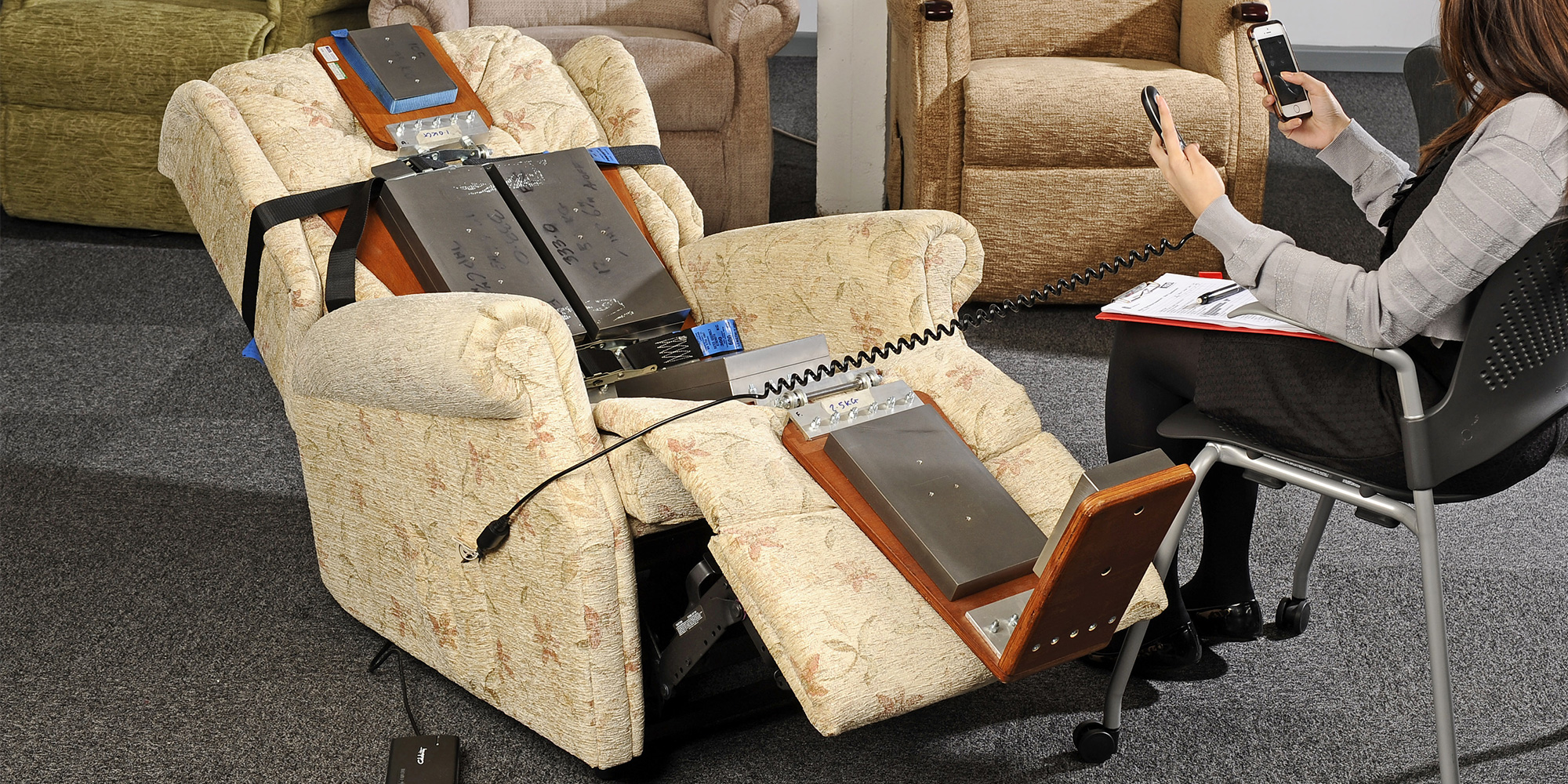BS EN 12520 Household Seating Durability and Safety Testing of Adjustable Chairs
The British Standard (BS) EN 12520 is a comprehensive framework designed to ensure the durability and safety of household seating, particularly focusing on adjustable recliners. This standard is crucial for manufacturers, designers, and quality assurance departments in the furniture industry as it provides clear guidelines on testing methods and acceptance criteria.
Recliners are complex pieces of furniture that combine comfort with functionality, often featuring multiple adjustment features such as headrests, footrests, and seat positions. These features make recliners more susceptible to wear and tear over time, which is why durability testing is essential. BS EN 12520 covers tests for both static and dynamic loading conditions, ensuring that the furniture can withstand typical household use without compromising safety or structural integrity.
Static load testing involves applying a specified weight (typically equivalent to an adult user) in various positions on the chair. This helps determine whether the frame and joints can handle sustained pressure safely. Dynamic load tests simulate real-world scenarios by replicating movements such as reclining, adjusting footrests, or changing seat angles under repeated cycles. These tests are critical for verifying that all moving parts function correctly while maintaining structural stability.
Testing must also consider the materials used in construction. For instance, fabrics and leathers need to be resistant not only to physical strain but also to environmental factors like humidity and temperature changes. Proper material selection is paramount; hence, testing ensures compliance with relevant textile standards such as ISO 105 or EN 3.
Another aspect of BS EN 12520 involves assessing the safety features of adjustable recliners. These include emergency stop mechanisms for footrests and headrests to prevent accidental injury during use. The standard specifies minimum strength requirements for these components, ensuring they can be operated safely even if power fails.
Manufacturers who adhere to BS EN 12520 gain several advantages. Compliance enhances brand reputation by assuring customers of product quality and safety. It also simplifies regulatory compliance processes across different markets since the standard is internationally recognized. Furthermore, meeting these requirements can lead to increased market share as consumers increasingly favor products that meet high standards.
Quality managers responsible for overseeing production often rely on rigorous testing protocols like those outlined in BS EN 12520. By incorporating this standard into their quality assurance programs, they ensure consistent product performance and reliability throughout the lifecycle of each piece of furniture produced.
In summary, compliance with BS EN 12520 is vital for any manufacturer seeking to produce high-quality, safe adjustable recliners. The comprehensive nature of this standard ensures that both durability and safety are addressed comprehensively, providing peace of mind for end-users while fostering trust within the industry.
Applied Standards
The British Standard (BS) EN 12520 is one of several international standards addressing household seating. Other relevant standards include ISO 9247, which deals with comfort and ergonomics; BS 6873 for child safety in furniture; and ASTM F2042 for outdoor residential furniture. Together, these standards form a robust framework ensuring that all aspects of household seating design are covered.
Specifically targeting adjustable chairs, EN 12520 focuses on specific durability tests such as cyclic loading for continuous use scenarios. It also includes requirements regarding the stability and strength of various components under load conditions. Additionally, it mandates checks on emergency stop functions to ensure safety features operate correctly during operation.
Compliance with these standards is not only beneficial but often mandatory when entering certain markets. For example, some countries require proof of conformity before allowing products into their borders. Therefore, understanding and adhering to these specifications can significantly reduce barriers to international trade.
Eurolab Advantages
At Eurolab, we pride ourselves on offering unparalleled services that cater specifically to the needs of our clients in the furniture testing sector. Our state-of-the-art facilities equipped with advanced instrumentation ensure accurate and reliable results for all types of tests required by BS EN 12520.
We employ highly skilled technicians who are experts in both technical operations and interpretation of test outcomes. This expertise allows us to provide not just raw data but also actionable insights that help our clients improve their products further. Our comprehensive approach includes detailed documentation which explains the testing process along with recommendations based on findings.
Our commitment extends beyond mere compliance; we strive to exceed expectations by offering customized solutions tailored specifically for each client's unique requirements. Whether it’s developing new prototypes or optimizing existing designs, our team works closely with clients throughout every stage of product development ensuring successful outcomes.
In addition to our technical capabilities, Eurolab offers several other benefits:
- Quick turnaround times
- Competitive pricing
- Flexible scheduling options
- Access to expert advice and guidance
Use Cases and Application Examples
The application of BS EN 12520 goes beyond just compliance; it plays a crucial role in ensuring the longevity and safety of adjustable recliners. Here are some practical examples:
Example 1: Prototype Validation: Before launching a new product line, manufacturers can use this standard to validate prototypes. This helps identify potential issues early on so that necessary adjustments can be made before mass production begins.
Example 2: Quality Control: During manufacturing processes, periodic checks using BS EN 12520 help maintain consistent quality levels across batches of products. This ensures customer satisfaction and reduces the risk of recalls due to defects or safety concerns.
Example 3: Export Compliance: Many countries have specific regulations regarding household furniture imports. By conforming to international standards like BS EN 12520, exporters can easily meet these requirements without additional testing costs.
Example 4: Research and Development: Companies involved in R&D activities often use this standard as a benchmark for comparing different designs or materials. It provides a standardized method of evaluation that allows meaningful comparisons between various options being considered.





